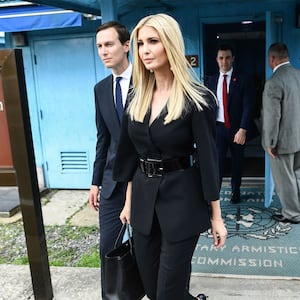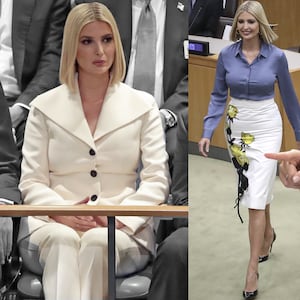On Aug. 16, 2016, just a few weeks after his father-in-law, Donald J. Trump, had clinched the Republican nomination for president, Esquire magazine ran a story entitled “Jared Kushner’s Second Act.” It was written by veteran journalist Vicky Ward and exposed a number of less-than-flattering details about the then 35-year-old head of his family’s real-estate firm, Kushner Companies.
Ward’s profile depicted a young, entitled scion who was at turns arrogant and vindictive. In one sense, the story emasculated Kushner, portraying him as a subservient son-in-law. This was certainly not the image of her husband that Ivanka Trump wanted presented to the world in the glossy pages of a popular men’s magazine.
So she did what any rich, New York City media-connected, powerful spouse would do—and then took it up a couple of notches: Ivanka, according to Ward, called Esquire’s editor-in-chief at the time, Jay Fielden, and literally started crying, pleading with him to take down the story. Firing on all cylinders, Ivanka also texted Ward and said she did not recognize her husband in the Esquire piece. Fielden, Ward told me, instantly saw through Ivanka’s “crocodile tears.” Jared and Ivanka’s side leveled against Ward for falsifying the story. But the piece remained online and was published in the October print issue; no substantive changes or retractions were made to Ward’s reporting. (The White House did not respond to a request for comment from Ivanka on the Esquire incident.)
While Jared and Ivanka might not go full Harvey Weinstein on reporters—the former movie executive hired ex-Mossad agents to track journalists and intimidate sources—there is no question, Ward says, that Jared and Ivanka have no compunction going to the head of news outlets to interfere with pieces they deem unflattering. “Every reporter knows they will be on the phone to Rupert Murdoch. Their guiding credo is PR above everything else. Ivanka thinks she is brilliant at public relations,” said Ward, the author of Kushner, Inc., and a senior reporter at CNN.
That might explain, in part, why Hunter Biden has gone through a media inquisition about his dealings in Ukraine and China, while Ivanka received virtually no additional press scrutiny after The New Yorker detailed her work on a real-estate project in Azerbaijan with local partners who had alleged ties to the Iran’s Islamic Revolutionary Guard Corps, a designated terrorist organization. The Senate Foreign Relations Committee subsequently called on the Justice Department and the Treasury Department to investigate the deal for possibly violating the Foreign Corrupt Practices Act.
Then there was Ivanka’s very close brush with a criminal indictment for inflating condo sales to potential buyers at the Trump Soho, a development project she helped oversee. And remember it was Ivanka, among others, who advocated for the hiring of Paul Manafort and Michael Flynn. (A spokesperson for a prominent Washington think tank told me it was “malpractice” by congressional Democrats that Ivanka hasn’t been subpoenaed by the House Intelligence Committee.) Somehow, though, none of these poor judgement calls have made it into the dominant media narrative about the first daughter.
While some may see this as business as usual—everyone in politics wants glowing coverage and it wasn’t like the Obama administration was a cakewalk for journalists, either—Ivanka, who along with her husband is an unpaid adviser to the President of the United States, is a whole other press animal. To start, she has spent “the near-entirety of her adult life working the media,” as The Financial Times noted in a 2017 profile. She also is that rarest of trifectas serving in the West Wing: a celebrity, a social media star, and a child of the sitting president. This status gives her unprecedented power to wield in the media arena, and wield it she does.
Ivanka doesn’t blast the press as the enemy of the people, like her father does. Rather, she sees the news media as her personal enrichment and image-enhancement tool—which was, for many years, very much the case when she was a socialite living on the Upper East Side, fawned over by the lifestyle and fashion press. One editor who has worked for three leading national publications told me that she thought that Ivanka is the hardest Washington beat to cover. “With Donald, it’s all out there. By contrast, Ivanka is secretive, cryptic, controlled, and poised,” the editor said speaking on the condition of anonymity.
She hasn’t been able to maintain this iron media grip alone. Early in 2017, shortly after getting themselves installed in senior Trump administration roles, she and Jared brought on their own PR flack, Josh Raffel, to serve in the West Wing’s communications operations. Raffel, who was a White House employee paid with taxpayer dollars, spent countless hours on the phone with reporters, including myself, defending the couple. The premise Raffel, who left the White House in 2018, pushed with some success into media zeitgeist: Ivanka has her narrow lanes—workforce development, human trafficking, global entrepreneurship—and therefore basically has a free pass on everything else.
It helps explain how Ivanka has managed to pull off the PR stunt of a lifetime: floating untouched above the reputational decline—she is, according to a June survey, polling better in swing states than her father—that has consumed the Trump administration’s entire inner circle, save her.
Like many other people living inside the Beltway fishbowl, Ivanka has made herself useful to reporters and employed the age-old Washington media practice of getting her message out there through surrogates and background and off-the-record conversations with journalists.
“Everyone, including Jared and Ivanka, leak to the press. I think in general it helps to leak if the person is under scrutiny,” said Sam Nunberg, a former Trump adviser and Zelig of the political news media world.
But Ivanka can also go into full attack mode when the news cycle winds aren’t favorable, specifically when she feels particularly embarrassed and belittled by the coverage. Take, for instance, the reaction of the White House press office after BBC reporter Parham Ghabodi tweeted a video taken by the French presidential palace showing Ivanka trying awkwardly to insert herself into a conversation with world leaders.
Ivanka, according to one Washington reporter, was extremely rankled by the media’s reaction to the video, which rang up nearly 23 million views and more than 100,000 likes and retweets. So Jessica Ditto, the deputy White House communications director who now handles most of the first daughter’s press, wrote a snarling email to Ghabodi: “Your speculative tweet has created negative attacks and press on something that could easily have been explained had you simply asked or read the information the White House and G20 released.” Ditto called critics of Ivanka’s “haters.” Rather than focus on advancing policy messages or American diplomatic objectives, the highest communications office in the country devolved into the attack dog and spin machine for Ivanka Trump.
“There are many White House reporters who are afraid to challenge her [Ivanka] and hold her accountable, because she and Jared are their entry into deeper relationships in the administration. I’ve talked to a least half a dozen reporters who have told me this,” one prominent public affairs professional in Washington, D.C., told me, speaking on the condition of anonymity so as not to compromise the organization’s relationship with the press.
I was astonished by how much time Raffel spent on the phone with me during the summer of 2017 while I was reporting a story about Ivanka for the Columbia Journalism Review. Given that Raffel’s portfolio ostensibly covered Jared and Ivanka’s full slate of policy issues, including the Middle East, why spend so much energy on a single story for a niche publication?
There’s no mystery here: Ivanka must win, or at least try to win, every piece, every snub, and every news cycle. And here’s how that strategy played out with my CJR story, which was examining, among other things, Ivanka’s accountability to the public for her record in business and government. On Sept. 3, 2017 I wrote to Raffel asking if I could get confirmation on the record of my distillation of Raffel’s previous statements about Ivanka; namely, that the White House believes Ivanka should only be held accountable by the media on the policy areas on which she works and oversees.
I told Raffel my deadline was Sept. 13 at noon. The day after my deadline, on Sept. 14, Raffel said Ivanka was officially declining to comment for my story. Coincidentally, that was the same day the Financial Times ran a flattering profile of the first daughter which Ivanka cooperated for, giving the paper three in-person interviews. Raffel wanted to make sure I had seen it, so on Sept. 15, he wrote me an email with a link to the Financial Times story and a short message saying: “probably worth reading this one. She [Ivanka] has said things on the record that are useful to ure [sic] story.”
The Financial Times piece essentially summed up what I had asked Raffel—in a nutshell, whether it was unfair to blame Ivanka for the transgender military ban or rolling back of EPA regulations—a few weeks before. Here’s how the Financial Times framed it: “Ivanka’s allies argue that it is unfair to blame her and her husband for controversial issues such as the president’s decision to pull out of the Paris climate-change accord, which she reportedly pleaded against.”
Raffel had gone for, and scored, the PR touchdown—putting his side’s spin out there prior to the release of what he perceived would be a critical counter-narrative. I was directed to Ivanka’s quotes in the Financial Times as the final word, which meant the message was delivered couched in the flattering FT profile, which landed first, and diminished the message of my piece. I was told the White House wouldn’t be saying anything else on the matter.
The first daughter wants to be on her own Ivanka policy island, distancing herself from the less savory parts of the administration. Even if this were defensible—i.e., that Ivanka shouldn’t be judged by the administration as a whole, but only the policy portfolio as she defines it for herself in the most favorable of light—her initiatives often collide with what the Trump administration is trying to pursue.
Last year, for example, Ivanka told the public that the administration is taking bold action to combat the evils of human trafficking, yet the administration she serves is approving the lowest level of so-called “T visas,” which provide immigration relief for foreign-born trafficking victims, since 2010. “They are transparently destroying protections for trafficking victims,” said Martina E. Vandenberg, the founder and director of the Human Trafficking Legal Center.
But what Ivanka’s pet issues really provide her with is cover and a very convenient distraction flag when the questions get dicey. For instance, when Ivanka was asked what she thinks about the Democrats’ effort to impeach her father for urging the Ukrainian president to open investigations into his political rivals, she can say, as she did on Fox News, that she’s just more focused on “fighting for the American worker” than anything else and that’s her “priority.”
Ivanka’s image has been immensely bolstered—and protected—by the lifestyle press. Just look at the Daily Mail’s breathless, almost sycophantic coverage that assiduously chronicles every outfit Ivanka wears as it would a member of the royal family, reinforcing Ivanka’s chosen image as an untouchable celebrity.
One way to look at Ivanka and her relationship with the press is that she is just another chapter in what is becoming the prevailing storyline of this era in American history: the protected status afforded to white, wealthy, socially connected, and media-savvy titans of business and culture. Something that has always stuck with me is an off-hand comment an editor made to me when I asked why there were so many roadblocks to covering Ivanka. The editor responded that many in the media see her as one of their own.
There is no shortage of bold-faced names—actresses, fashion icons, magazine editors, and socialites, the kinds of people who have or anticipate running into Ivanka on the Davos/Aspen circuit —who will be hysterically critical of the first daughter on social media (some, like Moda Operandi founder and contributing Vogue editor Lauren Santo Domingo will even tweet directly at Ivanka, saying things like she did in the aftermath of the Parkland shooting: “Arming teacher is a terrible, no good, very bad idea. @Ivankatrump, what they done to you?”) but will not comment on the record in the press. (Why they feel comfortable going on the written record on social media but not in the news media is somewhat baffling.) Many will speak off the record or anonymously, but never under their own name.
In over three years of reporting on Ivanka, the only person I found who was willing to break the Upper East Side code of silence and go on the record criticizing Ivanka was Christina Lewis Halpern. Her father, Reginald Lewis, was once the richest black man in America and she moved in the same social circles of New York City private schools and Ivy League schools as Ivanka. Lewis Halpern also covered real estate for The Wall Street Journal from 2005 to 2010. Lewis Halpern, who has since left journalism and founded a nonprofit called All Star Code, wrote an unpublished profile of Ivanka for the Journal about a decade ago, giving her deep insight into Ivanka and her world.
It was Lewis Halpern who tipped me off to the fact that Ivanka had lied on the back cover of her bestselling 2009 autobiographical self-help book, The Trump Card. Ivanka claimed she had graduated from Wharton summa cum laude, the highest distinction of honors given by the school, when she had really graduated cum laude, two notches below. (Ivanka’s PR team officially copped to it, calling it an “instance of confusion surrounding the specific level of honors.”)
Lewis Halpern also told me on the record how “tone-deaf” Ivanka sounded when talking about her quick professional ascent (“No one gets hired as a vice president in a multinational real-estate firm at the age of 24,” Lewis Halpern said, alluding to the nepotism that fueled her meteoric rise within the Trump Organization). And in 2016, Lewis Halpern called Ivanka out in a piece I wrote for Huffington Post’s Highline. Ivanka, according to Lewis Haplern, was aiding and abetting racism, acting as Donald Trump’s “surrogate” in “building a movement that fights against everything that I was raised to believe is true about America,” specifically economic and social justice for African-Americans and other historically oppressed people.
Since then, we’ve had Charlottesville, “shithole” countries, and all the rest. Lewis Halpern remains virtually alone among her peers in criticizing Ivanka.
Meanwhile, the Daily Mail is teasing how she’ll celebrate her 10th wedding anniversary at “'rustic' Camp David with intimate party—and no paparazzi.”








